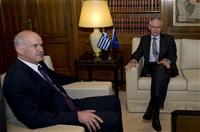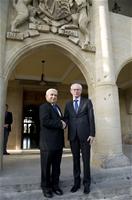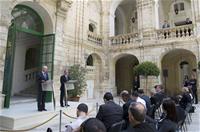Immigration and asylum will be the main topic of the June European Council
Adelina Marini, April 19, 2011
 Now that the reform of the European Union's economic governance and the euro area, in particular, is a fact, the EU can now pay attention to other not less pressing issues. Moreover, one of these pressing issues will be the main topic of the European Council on June 24, which euinside will follow from Brussels. This is the issue of migration, caused by the uprising in North Africa and the Middle East. And that the issue will be major becomes clear from the visit in three key on the topic countries of European Council President Herman Van Rompuy last week - Greece, Cyprus and Malta. The messages, however, were different for the three.
Now that the reform of the European Union's economic governance and the euro area, in particular, is a fact, the EU can now pay attention to other not less pressing issues. Moreover, one of these pressing issues will be the main topic of the European Council on June 24, which euinside will follow from Brussels. This is the issue of migration, caused by the uprising in North Africa and the Middle East. And that the issue will be major becomes clear from the visit in three key on the topic countries of European Council President Herman Van Rompuy last week - Greece, Cyprus and Malta. The messages, however, were different for the three.
Tapping on the shoulder for Greece
Although starting his statements in each country with the economic agreements from the Spring European Council, the European president then goes on to discussing the topic of the next European Council. Probably for this economic transition Greece got only a tapping on the shoulder for "the significant efforts that Greece is making to strengthen the management of its external borders". Herman Van Rompuy and Prime Minister George Papandreou were unanimous that the measures that were to be taken at a European Union level were not sufficient, which is why new or improved partnerships will have to be developed with the countries in the South Mediterranean.
Mr Van Rompuy also noted the success of the FRONTEX mission (the European border agency) and of the new body - the European Asylum Support Office. FRONTEX is assisting the Greek authorities in protecting the Greek-Turkish border, awaiting for the conclusion of a readmission agreement with Turkey. In the same time, the president underlined that the Schengen area and the asylum system can function only if participating countries "can trust each other to implement the agreed rules correctly".
Cyprus depends on Turkey
In the Greek part of the divided island of Cyprus, which is a member of the EU,  President Van Rompuy was short, given his statement. He and President Dimitris Christofias were unanimous that cooperation with the countries from the South Mediterranean was needed to build capacity in the area of border management and fight against irregular migration and traffic of human beings. "I know that Cyprus attaches particular importance to the conclusion of an EU level agreement on readmission with Turkey. This would indeed help to manage migration flows and to combat irregular immigration. The EU will continue to push for the swift conclusion and entry into force of the agreement".
President Van Rompuy was short, given his statement. He and President Dimitris Christofias were unanimous that cooperation with the countries from the South Mediterranean was needed to build capacity in the area of border management and fight against irregular migration and traffic of human beings. "I know that Cyprus attaches particular importance to the conclusion of an EU level agreement on readmission with Turkey. This would indeed help to manage migration flows and to combat irregular immigration. The EU will continue to push for the swift conclusion and entry into force of the agreement".
Probably the issue will be among the main ones at the EU-Turkey Association Council on April 19 in Brussels. Mr Rompuy also expressed hope for a quick finding of a solution to the Cyprus issue about the unification of the island.
Malta - small and vulnerable
The problems of the small central Mediterranean island with illegal immigration date back long time ago and are constantly growing. Currently the country is facing literally a refugee tsunami, being the closest EU territory to the South Mediterranean. This is why the main message the EU president conveyed in the capital Valletta was precisely this - that the Union was very well aware of Malta's concerns regarding the events in Libya and the neighbouring countries. "The challenges are especially significant in view of your size and population. Malta can be assured that the EU will continue to show solidarity as well as with other Member States directly affected by large scale migratory movements. We can and we should do more", Van Rompuy said.
 He recalled that as an expression of solidarity EU member states got involved with the pilot project EUREMA, whose aim is to voluntarily take over from Malta persons in need of international protection. According to Herman Van Rompuy this project is already delivering results.
He recalled that as an expression of solidarity EU member states got involved with the pilot project EUREMA, whose aim is to voluntarily take over from Malta persons in need of international protection. According to Herman Van Rompuy this project is already delivering results.
Besides, Malta will receive assistance, including financial, from the European border agency FRONTEX. And regarding the pressure from Libya the Union is ready to contribute to the maximum extent possible to repatriate third country nationals leaving Libya. Obviously in an attempt to demonstrate the efforts the Union is investing, Mr Rompuy recalled specific actions which have been undertaken so far:
- To manage the recent humanitarian emergency, the EU has mobilised 30 mn euro. Together with the funds provided bilaterally by Member States and by international donors. This amount was used to provide temporary shelters for migrants and refugees, for food and medicines, as well as to assist the return to home countries.
- Another 25 mn euro was allocated to those member states most exposed to the growing flows of refugees and immigrants, such as Malta.
- Teams from the European Asylum Office which is in the process of being established in Valletta could be deployed to help the authorities to screen the asylum seekers. In this regard Malta has a carte blanche to enhance its bilateral relations with the countries from the south neighbourhood, based upon its needs.
In the three countries Herman Van Rompuy said that they would be actively involved in the preparation of the issue for the summit on June 24, dedicated to immigration and asylum. This will be an important Council for Bulgaria too in the context of Bulgaria's wish for a fast accession to the Schengen area.